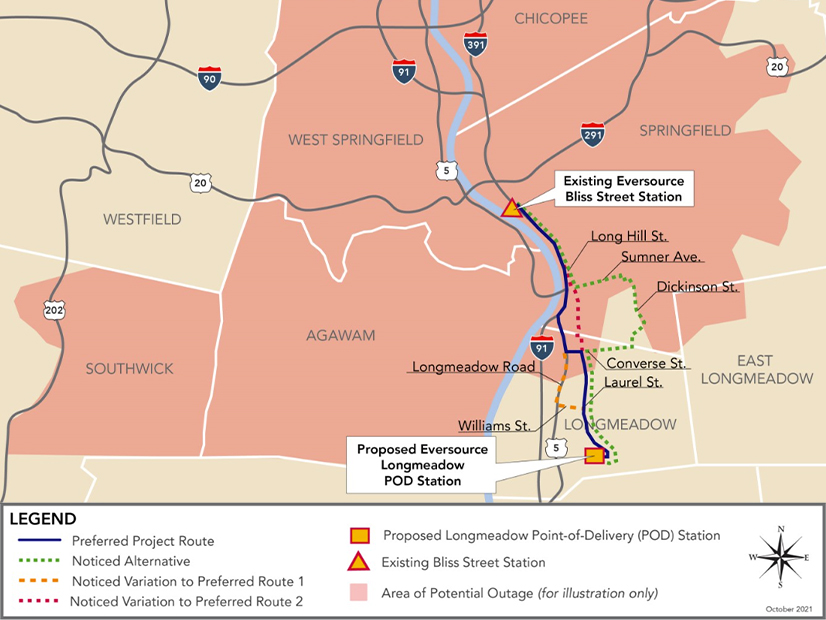Eversource needs to provide more information regarding the climate and environmental justice effects and overall justification for a hotly contested gas pipeline project in Western Massachusetts, the state’s Executive Office of Energy and Environmental Affairs (EEA) ruled this month.
The state said the company’s Draft Environmental Impact Report (DEIR) for the proposed 5.3-mile-long pipeline running between Springfield and Longmeadow is inadequate. The state did not rule out a “No Build” alternative, saying Eversource did not justify the basic need for the project.
“The DEIR has not provided an adequate alternatives analysis, and has not fully justified dismissal of the ’No Build’ Alternative or other non-pipeline alternatives,” wrote EEA Secretary Rebecca Tepper.
Eversource has argued the pipeline is necessary to ensure reliability for gas customers in the area.
“More than 58,000 of our natural gas customers in the Greater Springfield area are currently served by a single 70-year-old natural gas pipeline system, and [the new pipeline] will provide a much-needed second supply source to enhance reliability for nearly 200,000 people and businesses in the area,” an Eversource spokesperson wrote in a statement to NetZero Insider.
The company said the pipeline project — which includes a new point-of-delivery facility in Longmeadow and upgrades to the Bliss Street Regulator Station in Springfield — is not an expansion project, and new customers in the area will be served by existing infrastructure.
Tepper acknowledged Eversource’s claims the pipeline is not meant to expand gas supply but wrote that this was due to a lack of approval for expansion from the state’s Department of Public Utilities (DPU) and that the proposed project appears to have the capability to increase supply in the future.
“The DEIR indicated that there will be no increase in gas because the DPU has not approved an increase, not because of any design or engineering capacity limitations of the project,” Tepper wrote.
Tepper pressed the company for more detail on the project justification and potential non-pipeline alternatives to meet reliability needs, while noting the context of the state’s emissions goals and desire to phase out natural gas.
“Beyond reiterating the ‘worst case’ scenario in which gas service is suspended to all 58,000 customers … the DEIR did not explain why this risk is deemed to be present in this particular location within the Proponent’s statewide territories, nor does it point to any studies or historical precedents that would require prioritizing the mitigation of risk at this location,” Tepper wrote. “The DEIR did not attempt to quantify the probability of risk, or present any reduced scenarios other than the worst-case outage scenario.”
Tepper added that Eversource “has not shown why a ‘hybrid’ scenario of combining shorter-term redundancy solutions (such as use of compressed natural gas (CNG) or liquified natural gas (LNG) to meet winter peak demand), combined with a longer-term transition to other fuel sources, may not be a feasible option.”
Eversource wrote in the project’s Environmental Notification Form that it “views the responsible and efficient use of natural gas as consistent with climate change policies and net-zero carbon objectives.”
Climate And Environmental Impacts
The state also called for more information on how the pipeline would affect carbon emissions and the health of nearby residents, many of whom live in state-designated environmental justice populations.
Tepper wrote that nearby environmental justice populations face above-state-average risks for a wide range of pollution indicators, including ozone, diesel particulate matter, air toxics respiratory hazard index, hazardous waste proximity and wastewater discharge.
The Asthma and Allergy Foundation ranked Springfield as the U.S. “Asthma Capital” in 2018 and 2019, citing the cumulative impacts of pollen and air pollution, while ranking the city as the most challenging place in New England to live with asthma in 2022.
Eversource wrote in the DEIR that “the project will not affect the health of those living in the environmental justice areas.”
To supplement the DEIR, Eversource must include information related to safety concerns, climate resiliency of the infrastructure and plans for air pollution monitoring, as well as how the proximity to vulnerable populations factored into the choice of location.
Concerning the project’s carbon emissions, Tepper said Eversource must quantify the increase in gas supply that could result from the project, along with associated carbon emissions. Tepper also directed Eversource to conduct at least one public meeting to discuss the pipeline, alternative options, and potential environmental and health effects various options would have on the community.
“We’re currently reviewing the specifics of MEPA’s decision and will respond accordingly as part of our everyday efforts to ensure safe, reliable service for all of our customers while maintaining environmental responsibility,” Eversource said in its statement to NetZero Insider.
Prior to the state’s response to the DEIR, a wide range of climate and environmental justice groups submitted public comments detailing extensive climate and health concerns.
“We envision a just and rapid transition away from gas to a future of clean heat powered by clean electricity,” they wrote in the petition, signed by more than 6,000 Massachusetts residents. “This is urgent for our planet, our health and for communities facing expansion projects right now like Springfield and Longmeadow. We urge Governor [Maura] Healey to put a halt to new gas system expansions until there is a concrete plan for a just transition to a clean and green energy future.”
The project is required to procure several other permits and approvals, including an approval to construct from the Energy Facilities Siting Board, a zoning exemption from the DPU and a highway access permit from the Massachusetts Department of Transportation.




